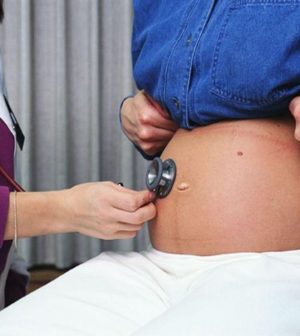- 10 Strategies to Overcome Insomnia
- Could Artificial Sweeteners Be Aging the Brain Faster?
- Techniques for Soothing Your Nervous System
- Does the Water in Your House Smell Funny? Here’s Why
- Can a Daily Dose of Apple Cider Vinegar Actually Aid Weight Loss?
- 6 Health Beverages That Can Actually Spike Your Blood Sugar
- Treatment Options for Social Anxiety Disorder
- Understanding the Connection Between Anxiety and Depression
- How Daily Prunes Can Influence Cholesterol and Inflammation
- When to Take B12 for Better Absorption and Energy
A New Way to Spot Pregnancy Risks?

Two placenta-related markers could reveal older women’s risk of serious pregnancy problems such as stillbirth and premature or very small babies, British researchers say.
They analyzed blood samples and medical data from 527 pregnant U.K. women, including 158 in their 20s; 212 in their 30s; and 157 in their 40s.
The study found that levels of placental growth factor and antioxidant capacity could help predict pregnancy risks in women 35 and older. Having a baby later in life has long been associated with increased risk.
“We already know the changes in oxidative stress and inflammation we saw in this study are associated with many pregnancy complications — but for the first time here, we found they were also present in older mothers, which could be damaging the placenta and might explain why older mothers face these higher risks,” said lead author Alex Heazell, a professor of obstetrics at the University of Manchester.
Placental growth factor is a protein produced in the placenta when it’s working well. Antioxidant capacity can show if cells in the placenta are inflamed or deteriorating.
Placental growth factor was 74% accurate in predicting serious pregnancy problems and antioxidant capacity was 69% accurate, according to findings recently published in the journal BMC Pregnancy and Childbirth.
The researchers also showed that the rate of serious problems in mothers who had previous successful pregnancies was half that of women who were pregnant for the first time.
In addition, researchers found that women over 35 who smoked had four times the risk of serious pregnancy problems compared to nonsmokers. Ex-smokers had double the risk.
Heazell said considering the placental biomarkers along demographic information and variables known to affect risk offer a better way of predicting an older woman’s odds of an adverse pregnancy outcome.
“However, larger studies are required to see if these markers can be developed into an individual predictive model,” he said in a university news release.
More information
The March of Dimes has more on pregnancy after age 35.
SOURCE: University of Manchester, news release, Nov. 1, 2021
Source: HealthDay
Copyright © 2026 HealthDay. All rights reserved.










